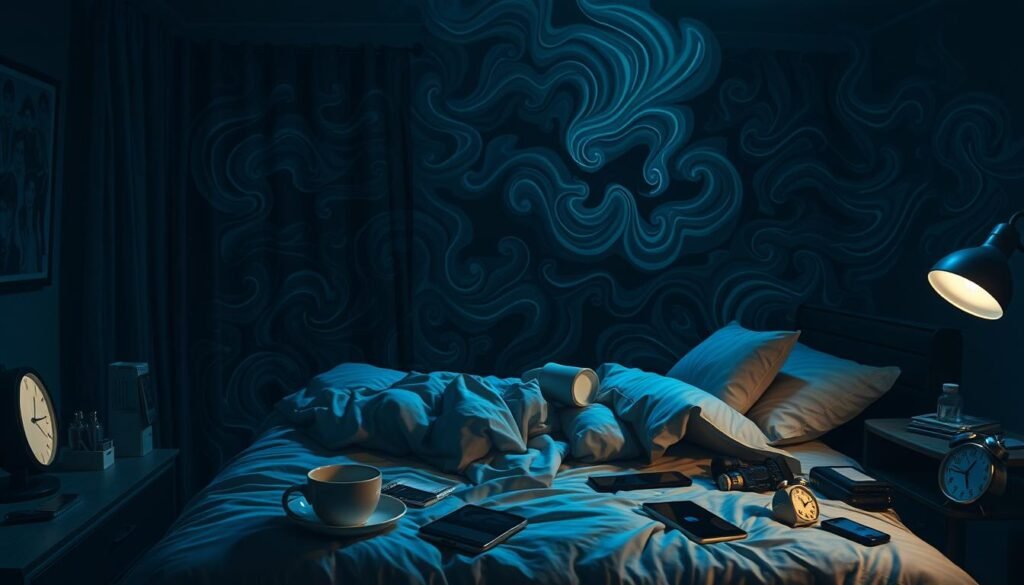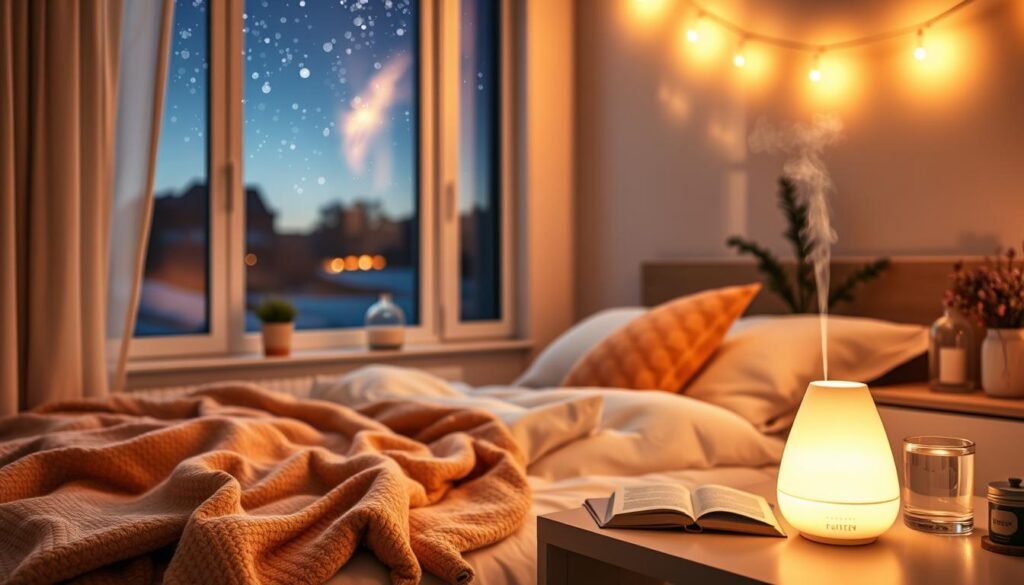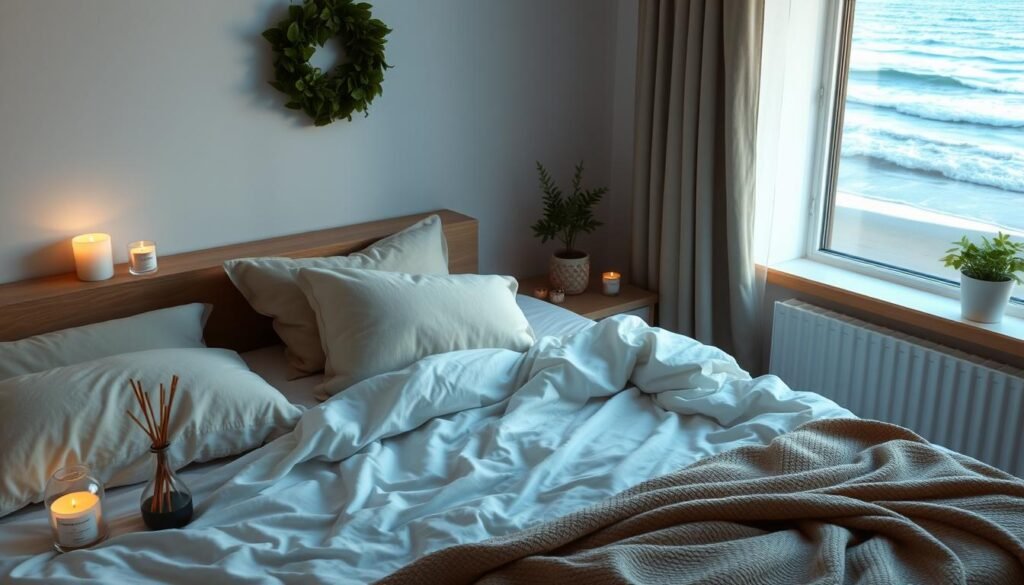Did you know about 30% of adults in the United States deal with acute insomnia at times? This fact shows that many have trouble getting or staying asleep, which leads to tiredness during the day. It also hurts their overall health. Luckily, there are ways to solve this problem.
Treatments for acute insomnia include sleep meds from doctors, cognitive behavioral therapy (CBT), and natural methods. Highlighting the importance of good sleep and providing helpful tips, people can enjoy better sleep. This improves their quality of life.
Key Takeaways
- Cognitive behavioral therapy is often the first treatment recommended for insomnia, proving effective without the side effects associated with sleep medications.
- Prescription sleep medications, such as Ambien and Lunesta, offer short-term relief but shouldn’t be relied on long-term.
- Establishing a strict sleep schedule is vital for effective sleep hygiene and improving sleep quality.
- Natural remedies, such as yoga, meditation, and melatonin supplements, can also play a role in enhancing sleep.
- Addressing lifestyle factors like stress, nutrition, and exercise is crucial in the treatment of acute insomnia.
Understanding Acute Insomnia
Acute insomnia is a common sleep disorder. It starts suddenly and lasts from one night to a few weeks. People with acute insomnia find it hard to fall asleep, stay asleep, or wake up too early. This poor sleep can hurt both mental and physical health, leading to health risks. Almost two-thirds of adults may face insomnia occasionally, showing how common it is.
Insomnia affects some people more than others. For instance, women, older adults, and young to middle-aged African Americans face it more. Being sick for a long time, having mental health challenges, or working night shifts can increase your risk.
Not dealing with acute insomnia can lead to serious problems. It can raise your chances of getting obesity, diabetes, and depression. You might also feel tired, grumpy, and have trouble remembering or concentrating during the day.
Even though you might not need to treat acute insomnia right away, it’s important to know when it’s serious. If it keeps happening, you should talk to a doctor. They can suggest treatments like behavioral therapy or sleeping pills for a while. Knowing about acute insomnia helps you make better choices for your sleep and health. Want to learn more about treatment? Check out Cleveland Clinic’s insights.
Common Causes of Acute Insomnia
It’s key to know why insomnia happens. Stress and anxiety often block relaxation, making it hard to sleep. Those with stressful lives or anxiety issues may see their sleep suffer.
Certain lifestyle factors also make sleep worse. Caffeine and nicotine before bed can keep you awake. Also, changing sleep schedules from shift work or travel hurts sleep quality.
Getting older plays a role too. People over 60 have a higher risk of insomnia, partly due to health, meds, and sleep pattern changes. Knowing the causes of insomnia helps identify sleep problems. With this knowledge, you can work on better sleep habits.

| Cause | Description |
|---|---|
| Stress | Life events and daily pressures that create tension or worry. |
| Anxiety | Ongoing feelings of apprehension or fear that disrupt relaxation. |
| Lifestyle Factors | Irregular sleep patterns, stimulants like caffeine, and poor sleep habits. |
| Age | Older adults face changes in sleep due to health conditions and medications. |
Effective Acute Insomnia Treatment Options
Acute insomnia, often caused by stress or changes in routine, needs quick and effective treatment. There are three main treatments: sleep medications, cognitive behavioral therapy (CBT), and natural remedies. Knowing about these can help people make the best choices for their sleep health.
Sleep Medications
Sleep medications are key for solving acute insomnia. Sedatives like triazolam and lorazepam are strong sleep inducers. Options such as zolpidem and eszopiclone are liked for their fewer side effects. New medications, like Belsomra and daridorexant, adjust the sleep-wake cycle. For those who wake up often, doxepin (Silenor) works by blocking histamines. However, it’s important to use these medications carefully to avoid dependency. You can find more about these treatments here.
Cognitive Behavioral Therapy (CBT)
Cognitive behavioral therapy (CBT) for insomnia is a strong non-drug treatment. It changes the thoughts and behaviors causing sleep problems. It offers techniques to reduce anxiety and better sleep patterns. Studies show CBT’s effects last from six to twenty-four months. This makes it a solid option for both acute and chronic insomnia sufferers.
Natural Remedies
Natural remedies are a good addition to insomnia treatments. Regular exercise improves health and sleep quality. Techniques like meditation, yoga, and relaxed breathing reduce stress and improve sleep. Also, creating a good sleep environment—keeping the bedroom dark and quiet, and avoiding big meals or caffeine before bed—helps a lot. It’s important to find the right combination of these strategies for better sleep.

Best Practices for Sleep Hygiene
Improving your sleep hygiene can make a big difference in your life. It affects how well you perform each day and your overall health. Starting a regular bedtime routine can help. Studies show that poor sleep habits can lead to health problems, like not sleeping enough and insomnia.
Try to go to bed and wake up at the same time every day, even on weekends. This helps set your body’s internal clock. A calming routine before bed makes this easier, helping your mind and body relax.
Having the right environment for sleep is key. Make sure your room is dark, cool, and quiet for better sleep. You can use blackout curtains and earplugs or white noise machines to block out noise. A comfy mattress and pillows add to a restful night.
Stay away from caffeine and nicotine late in the day. They make it hard to fall asleep. Even though alcohol might make you feel sleepy at first, it can mess up your sleep later on. Try not to eat big meals close to bedtime. Go for a light snack instead.
Being active during the day is also important. Exercise helps you fall asleep easier at night, and it’s good for you in many other ways. These tips are the foundation for better sleep health.
| Sleep Hygiene Practice | Benefits |
|---|---|
| Consistent Sleep Schedule | Normalizes sleep patterns, leading to better rest. |
| Calming Bedtime Routine | Enhances relaxation, preparing the body for sleep. |
| Ideal Sleep Environment | Supports better sleep quality through comfort and quiet. |
| Avoid Stimulants | Prevents difficulties falling and staying asleep. |
| Regular Exercise | Promotes easier sleep and provides overall health benefits. |
| Light Evening Meals | Minimizes disruptions to sleep from digestion. |
Relaxation Techniques to Combat Insomnia
Many people find it hard to fall asleep because of stress and worry. Adding relaxation methods to your daily life can greatly improve your sleep. Meditation and breathing exercises are two great ways to relax. They help calm your mind, making it easier to fall asleep.
Meditation
Meditation is a strong way to fight insomnia. It helps your body relax naturally. By calming your mind, it lowers stress hormones like cortisol. If you meditate for 20 to 25 minutes regularly, you will feel less stressed. This helps you sleep better at night.
Breathing Exercises
Breathing exercises are also really helpful. They can calm you down and slow your heart rate. Doing these exercises every day can relax you and help you sleep. They make dealing with daily stress easier, which improves your sleep quality.

| Relaxation Technique | Benefits | Recommended Duration |
|---|---|---|
| Meditation | Reduces stress hormones, promotes emotional calm | 20-25 minutes daily |
| Breathing Exercises | Slows heart rate, eases anxiety | 10-15 minutes daily |
| Yoga | Enhances physical relaxation, reduces tension | 30 minutes 2-3 times a week |
| Tai Chi | Improves body awareness, balances energy | 30 minutes 2-3 times a week |
Role of Melatonin Supplements in Sleep
Melatonin supplements are key to fixing sleep problems, like insomnia. They adjust the sleep-wake cycle to improve sleep quality. Studies show melatonin can help those with insomnia fall asleep a bit quicker. This is good news for anyone having trouble sleeping.
Taking 1 to 3 milligrams of melatonin two hours before bed is often advised. This method helps you fall asleep and eases jet lag, making you more alert and less sleepy during the day. Lots of people find melatonin makes a big difference in their sleep.
Melatonin supplements are safe for short-term use. They work well for issues like delayed sleep phase syndrome, helping anyone struggling to keep a regular sleep schedule. But, they might cause headaches, dizziness, or drowsiness.
Before starting melatonin, it’s smart to talk to a doctor, especially if you have health issues like diabetes or high blood pressure. Melatonin might not mix well with some medicines, so getting advice from a doctor is important.
Not everyone reacts the same way to melatonin. This shows why finding the right sleep solution is personal. For more tips on fixing sleep problems, check out this resource on battling insomnia.
| Factor | Impact of Melatonin |
|---|---|
| Time to Fall Asleep | May reduce time taken to fall asleep |
| Sleep Quality | Enhances overall sleep quality |
| Jet Lag Symptoms | Improves alertness and reduces daytime sleepiness following travel |
| Side Effects | Headache, dizziness, nausea, drowsiness |
| Target Conditions | Insomnia, delayed sleep phase syndrome, circadian rhythm sleep disorders |
Light Therapy for Sleep Disorders
Light therapy is a great way to manage sleep disorders, especially those that mess up circadian rhythms. It usually uses a light box with bright light of about 10,000 lux. You need to sit about 16 to 24 inches from it for 20 to 40 minutes. If the light is weaker, around 2,500 lux, it might take up to two hours.
Studies show light therapy really helps people with Seasonal Affective Disorder (SAD). Doing this during winter can cut down depression by 36%. Even an hour of it can make a big difference in how sad someone feels. People also say it makes their sleep and mood better.
It’s easy to try light therapy at home since there are many products like desk lamps and special alarm clocks. Being able to use them regularly at home is key to fixing circadian rhythms.
Aside from helping with SAD, light therapy works for regular depression too, especially with antidepressants. It’s also good for those with Alzheimer’s by helping them sleep better at night and stay awake during the day.
Most of the time, it’s best to do light therapy in the morning. But for SAD, doing it later might work better because of the early nightfalls in fall and winter. For more info on how light therapy can help with insomnia, check out this link here.
| Light Intensity | Distance | Session Duration |
|---|---|---|
| 10,000 lux | 16-24 inches | 20-40 minutes |
| 2,500 lux | 16-24 inches | Up to 2 hours |
Conclusion
Treating acute insomnia is vital for people who yearn for healing sleep and a better life. Lifestyle changes, cognitive behavioral therapy, and sometimes medical help are key. Studies show Cognitive Behavioral Therapy for Insomnia (CBT-I) significantly lowers insomnia’s impact. This makes it a top choice among sleep experts.
Knowing how acute insomnia can become chronic is important for good sleep health. Cognitive and behavioral factors play a role in this shift. With knowledge and expert advice, individuals can find specific ways to fight their insomnia.
Anyone with ongoing sleep issues should seek thorough evaluations without delay. There are many strategies available, from behavioral techniques to direct treatments for acute insomnia. These can lead to restful sleep, boosting overall health and well-being.